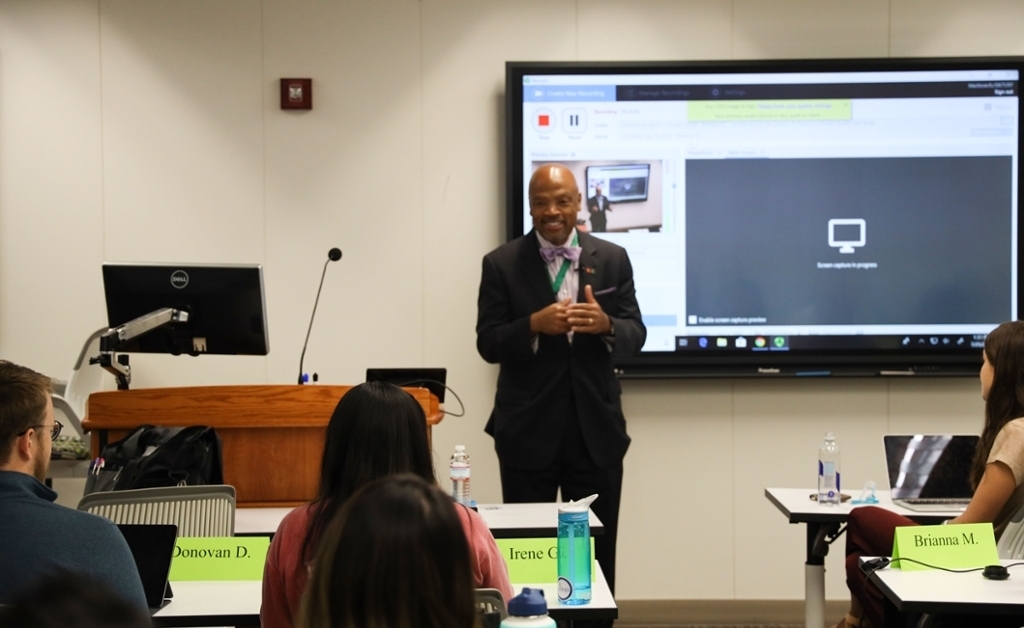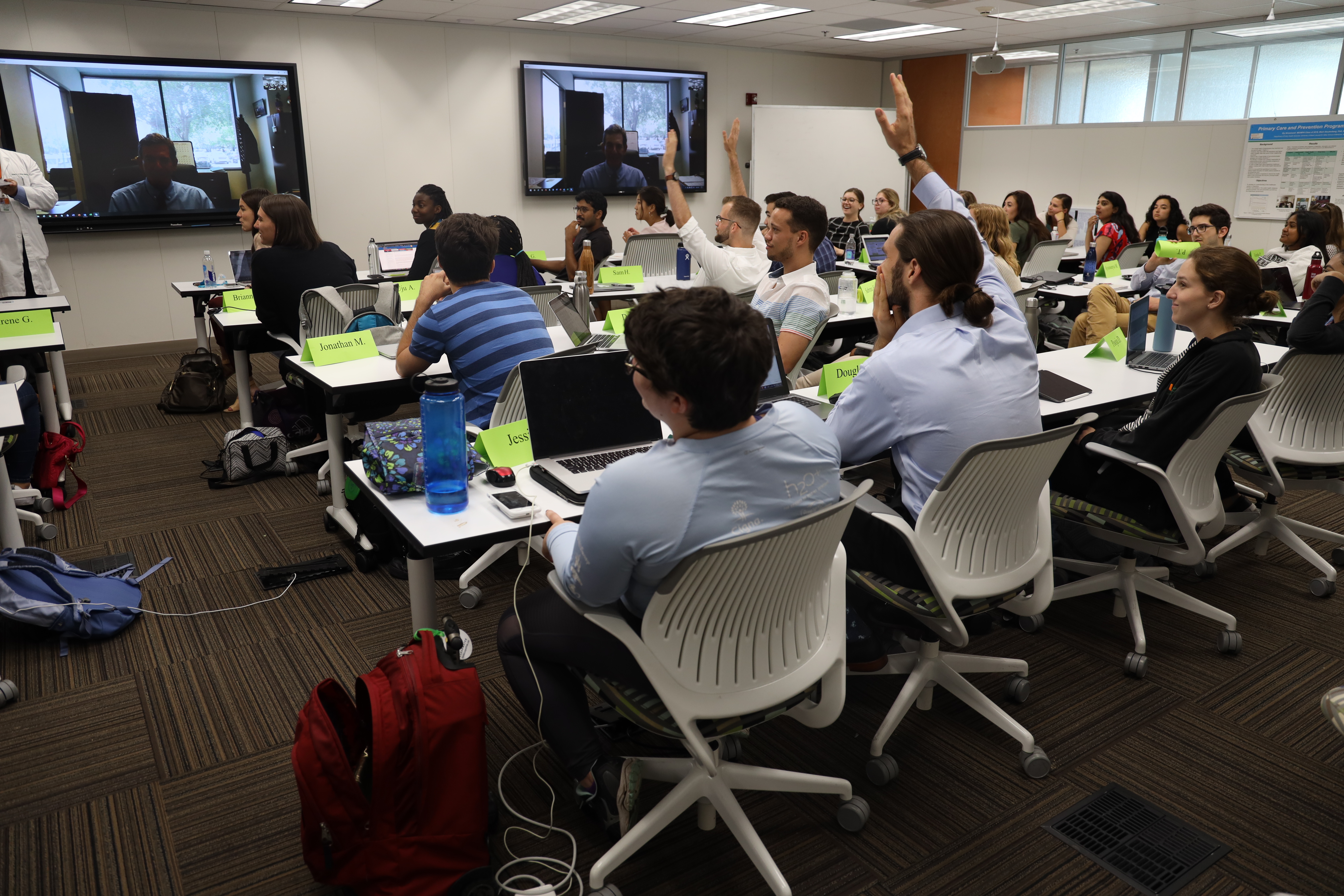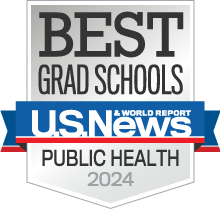Dean Henri R. Ford and Dr. Scott H. Rivkees Welcome the M.D./M.P.H. Class of 2023

Henri R. Ford, M.D., M.H.A., dean and chief academic officer of the University of Miami Miller School of Medicine, and Scott Rivkees, M.D., the Florida State Surgeon General, welcomed and spoke to first-year M.D./M.P.H. candidates during one of their epidemiology courses this summer. The candidates began their medical education journey this week.
“You will find that I am here to serve as your leader in whatever you may need. The overarching essence of the Miller School is to empower our learners, to transform lives, and to inspire you to serve our global community. There is no group that embodies this better than the M.D./M.P.H. students because you are self-selected to do exactly that. And so, it's a special privilege to meet and address you,” Dean Ford said.
He shared that the most important task of being in medical school is truly the training of future physicians and added that there is nothing more important in the Miller School’s mission than the educational component.
“Not only do you feel that you are going to be able to use all of the clinical reasons why someone in Brickell has asthma, for example, but you will also be able to understand and define the reasons why the individual who lives in Brickell has a life expectancy that is 15 years higher than that one that is just next door in Overtown, which is only 2.8 miles away,” he said.
As students listened closely, Dean Ford added that the profile of Miller School graduates will ultimately produce transformational leaders, individuals who are going to be able to shape the future of medicine, people who are going to be able to make discoveries and translate them to clinical intervention that will improve the health of humanity. The goal, he said, is to also produce leaders that will be able to correct power systems and make sure that value-based health care is being delivered, whether on an individual basis or within the context of a health system.
All the way from his office in Tallahassee, Fla., Dr. Rivkees spoke to students via Skype and began the address by sharing his educational background and advice based on his experience.
 “I didn’t have formal training in public health, but as you will see when you start doing your clinical rotations, so much of health really is public health. And the problem solving that you develop over the course of your careers is really applicable to so many different areas,” said Dr. Rivkees. “The other thing is that physicians are lifelong learners and you will always change in different parts of your career to learn different expertise along the way that you need. And then also medicine is so interactive, and you can always call on expertise for individuals even if you don't have a particular background.”
“I didn’t have formal training in public health, but as you will see when you start doing your clinical rotations, so much of health really is public health. And the problem solving that you develop over the course of your careers is really applicable to so many different areas,” said Dr. Rivkees. “The other thing is that physicians are lifelong learners and you will always change in different parts of your career to learn different expertise along the way that you need. And then also medicine is so interactive, and you can always call on expertise for individuals even if you don't have a particular background.”
Dr. Rivkees, a northern New Jersey native, pursued both his undergraduate and medical education at Rutgers University and completed his medical training in Massachusetts General Hospital in Boston. He completed his residency and fellowships in pediatrics and did a five-year post-doctorate in neuroscience.
He began his career as a faculty member in Massachusetts General Hospital working on endocrinology and running a basic science research lab. His lab was focused on circadian rhythms and melatonin receptors. After being at the hospital for about twelve or thirteen years, he then moved to Indiana.
“After being in Indiana for about four years, I went to Yale University where I continued the model of physician-scientist and worked in a basic science research laboratory. We were part of the initial group to clone the family of adenosine receptors and looked at how to influence heart and brain development. I also had an NIH-funded research laboratory,” shared Dr. Rivkees.
After more than 33 years, he moved from Connecticut to Florida to work in pediatrics. What was exciting about this opportunity, he shared, was being able to help remake pediatrics in a way that allowed the field to move forward, integrating clinical care research into practice.
“If you asked me four months ago if I ever thought I'd see myself sitting in this chair as State Surgeon General, the answer would have been no. I was approached by somebody where they said that they were looking for somebody that had experience in not just basic science research, but in public health and public policy as well,” he added.
At this point for Dr. Rivkees, things pivoted. The early part of his career was focused on basic science research and now there is a public health and public policy element to it that he became involved with in full force.
“It was great hearing both Dean Ford and Dr. Rivkees talk about their impressive careers and what led them to their current positions. Both of them began working in clinical and academic medicine rather than in public health,” said William Pavlis, a first-year M.D./M.P.H. candidate. “Now, in their current positions, they deal with topics related to health systems and population health on a daily basis. As future public health physicians, we value being able to see how the two fields interact and what a career in both may look like.”
“Dr. Rivkees and Dean Ford were both clearly very passionate while maintaining personability and humor. Dean Ford gives the impression of being very approachable. From a career perspective, I was motivated to see these two men so engaged in their work, and to see the potential and range of options ahead for my own future,” added Sabrina Hennecke, a first-year M.D./M.P.H. candidate.
Written by Amanda Torres
Published on August 20, 2019




 “I didn’t have formal training in public health, but as you will see when you start doing your clinical rotations, so much of health really is public health. And the problem solving that you develop over the course of your careers is really applicable to so many different areas,” said Dr. Rivkees. “The other thing is that physicians are lifelong learners and you will always change in different parts of your career to learn different expertise along the way that you need. And then also medicine is so interactive, and you can always call on expertise for individuals even if you don't have a particular background.”
“I didn’t have formal training in public health, but as you will see when you start doing your clinical rotations, so much of health really is public health. And the problem solving that you develop over the course of your careers is really applicable to so many different areas,” said Dr. Rivkees. “The other thing is that physicians are lifelong learners and you will always change in different parts of your career to learn different expertise along the way that you need. And then also medicine is so interactive, and you can always call on expertise for individuals even if you don't have a particular background.” 
